- Home
- Jack Canfield
Chicken Soup for the African American Soul Page 2
Chicken Soup for the African American Soul Read online
Page 2
My mother drew parallels between her grandmother Emily and Jacqueline Kennedy. “Emily was class,” she would say, describing her physical attributes: her long, graceful neck, her tiny, tiny waist. “Emily was class, Emily was elegant, just like Jackie.”
How my mother came by this first-name familiarity with the president’s wife I couldn’t begin to imagine, but as I grew older and listened carefully to other stories about my great-grandmother Emily that was the least of my bafflement. The pieces wouldn’t fit. On the one hand, Emily, refined, graceful, elegant, soft-spoken, classy. On the other, Emily, a woman from the backwoods of Louisiana, possibly born a slave right before the Civil War, unapologetic about dipping snuff, buzzed on her homemade muscadine wine each and every day. Not exactly “just like Jackie.”
Emily intrigued me and the puzzle of this woman simmered on the back burner of my conscious mind for decades, undoubtedly triggering questions about who I was as well. Not until 1995 did the search really start to heat up, for the simple reason that I was no longer gainfully employed and suddenly had massive quantities of time on my hands. I had been a corporate executive, vice president and general manager of Sun Microsystems in Silicon Valley, when I decided to change my life by stepping off into the great unknown. I quit my job. Not a sabbatical. No looking back or second-guessing. Just walked away.
“When does your new job start?” asked my mother. Actually, what I heard was, “How could you possibly walk away from a good job you got only because I sacrificed to put you through school, and by the way, I spent fourteen hours in labor to get you here in the first place.” She didn’t really say the last part, at least not out loud, but that is what it felt like she said.
“I refuse to take a job for at least a year,” I replied, trying to sound confident. “I need to listen to the silence, find the inner me, reengineer myself outside of the confines of corporate America.”
My mother had no patience with this drivel. “Who’s going to pay you to do that?”
“I’ve saved enough for a year or two.”
“Can you get your old job back?”
“I don’t want my old job. It’s gone. There’s something else I’m supposed to be doing,” I said. “I just don’t know what it is yet.”
“You’re supposed to have a job.”
I let the silence build. For some things, there is no response.
“So what are you going to do for the next year?” she pushed.
Here was the critical moment where a persuasive argument could win her to my side, put her mind to rest, reassure her of my ability to adapt.
“I don’t know,” I said, which unbeknownst to me would become my mantra of the next few years.
I couldn’t explain it because I didn’t understand it, but I felt compelled to leave my job and research my ancestry. Gradually, and then overwhelmingly, I slipped into the dark, shadowy, addictive parallel universe of genealogy. Entire days disappeared from my life when I entered the bowels of the National Archives to pore over census records. Secretive trips to Louisiana to chase down fragile leads in local courthouses, newspaper archives and libraries followed. I began to lie to my friends, telling them I was “just relaxing, taking it easy, enjoying my newfound free time.”
Meanwhile, the relentless search for dead relatives consumed weeks and then months. I lost all sense of shame, carrying tape recorders into nursing homes to interview people who couldn’t remember what they had for breakfast but could spin sharp tales of events from eighty years ago. I craved one more fact, one more connection, one more story, but one was never enough. I had to have more, to know more about the people in my family, dead for a hundred years. I was hooked.
So hooked, I traced my mother’s line to a place in Louisiana called Cane River, a unique area that before the Civil War housed one of the largest and wealthiest collections of free people of color in the United States. I decided to hire a specialist on Cane River culture, a genealogist who could read the Creole French records that I could not. The task I assigned her was to find my great-grandmother Emily’s grandmother.
“Let’s get the facts we know on the table, starting with her name,” the genealogist said.
“I don’t know.” (The mantra echoed.)
“No first name or last name?”
“No.”
“Okay. Was she from Cane River?”
“Maybe,” I said encouragingly. “Her daughter was.”
“Okay. Was she slave or free?”
“I don’t know. I can’t find any trace of her in the free census records, but I’m not sure.”
The genealogist seemed doubtful, but she took the job anyway. I was, after all, paying her by the hour just to look.
No job, no paycheck, so how long could this foolish obsession to find my unnamed great-great-great-great-grandmother last? Turns out, for eighteen months, by the hour, until the genealogist recovered a document that banished any doubt I would write a historical novel based on the characters revealed. In a collection of ten thousand unindexed local records written in badly preserved Creole French, she found the bill of sale for my great-great-great-great-grandmother Elisabeth, who was sold in 1850 in Cane River, Louisiana, for eight hundred dollars.
I wondered whether my great-great-great-great-grandmother spent as much time envisioning her descendants as I had spent envisioning her life. I held the bill of sale in my hands, awed and humbled, curious what any one of the women who came before me, born slaves, would think of one of their own having the opportunity to become an executive at a Fortune 500 company. Could any of them have even dreamed of that possibility in 1850 as they changed hands at auction from one property owner to another? I wondered what they would think of the world we live in today. What would Elisabeth have thought of my quitting my job and spending far more than her selling price to find any evidence she had existed?
At this point, I had no choice. I had to write their story and document their lives—my history. They were, after all, real flesh-and-blood people. I pieced their lives together the best I could from over a thousand documents uncovered in my years of research, re-creating what life must have been like for them during the 1800s and 1900s. The result was Cane River, a novelized account covering one hundred years in America’s history and following four generations of Creole slave women in Cane River, Louisiana, as they struggled to keep their families intact through the dark days of slavery, the Civil War, Reconstruction, and the pre-civil rights era of the Jim Crow South.
The rest—the dog-work of writing the novel, finding an agent, finding a publisher and doing the book tour—was as grueling and exciting as discovering my ancestry. Within days of being sent to several publishers, Warner Books purchased the novel. Once again, my family was on the auction block but this time in a more satisfying way, honoring instead of dishonoring. Things had certainly changed over the last hundred and fifty years. I wished I could show my great-great-great-great-grandmother Elisabeth the price our family commanded this time.
Three months after the publication of Cane River, the phone rang as I was packing for yet another book-signing trip.
“Hello, this is Oprah.”
“Yeah, right!” I said, wondering which of my friends was playing this cruel practical joke. I waited for laughter that never came.
“This is Oprah,” the distinct and ever-so-familiar voice said again.
As recognition registered, I mustered my most professional corporate voice in the midst of my total embarrassment and surprise.
“Hello, Ms. Winfrey. What can I do for you today?” My heart pounded so hard I could hardly hear what followed.
She had called to tell me she selected my novel for her book club, which ultimately led to Cane River spending seventeen weeks on the New York Times bestseller list and a readership broader than I dared dream.
My mother has conceded once, and only once, that quitting my job wasn’t as disastrous as she had feared. But she still thinks I should be out interviewing for a corporate position
, as a backup. The women in my family are strong, and strength is a mother’s legacy. Worry, on the other hand, now that’s a mother’s prerogative.
Lalita Tademy
Ain’t I a Woman?
If we study the lives of great men and women carefully and unemotionally we find that, invariably, greatness was developed, tested and revealed through the darker periods of their lives. One of the largest tributaries of the River of Greatness is always the Stream of Adversity.
Cavett Robert
Well children, where there is so much racket there must be something out of kilter. I think that ’twixt the Negroes of the South and the women at the North, all talking about rights, the white men will be in a fix pretty soon. But what’s all this here talking about?
That man over there says that women need to be helped into carriages, and lifted over ditches, and to have the best place everywhere. Nobody ever helps me into carriages, or over mud-puddles, or gives me any best place! And ain’t I a woman?
Look at me! Look at my arm! I have ploughed and planted, and gathered into barns, and no man could lead me! And ain’t I a woman?
I could work as much and eat as much as a man—when I could get it—and bear the lash as well! And ain’t I a woman?
I have borne thirteen children, and seen most all sold off to slavery, and when I cried out with my mother’s grief, none but Jesus heard me! And ain’t I a woman?
Then they talk about this thing in the head; what’s this they call it?
[Member of audience whispers, “Intellect.”]
That’s it, honey. What’s that got to do with women’s rights or Negroes’ rights? If my cup won’t hold but a pint, and yours holds a quart, wouldn’t you be mean not to let me have my little half measure full?
Then that little man in black there, he says women can’t have as much rights as men, ’cause Christ wasn’t a woman! Where did your Christ come from? Where did your Christ come from? From God and a woman! Man had nothing to do with Him!
If the first woman God ever made was strong enough to turn the world upside down all alone, these women together ought to be able to turn it back, and get it right side up again! And now they is asking to do it, the men better let them.
Obliged to you for hearing me, and now old Sojourner ain’t got nothing more to say.
Sojourner Truth (1797–1883)
Five Garbage Bags and a Dream
I attended high school in Syracuse, where I was not the greatest academic achiever. I did okay. My sports ability, however, attracted a great deal of attention from small colleges in the region. I received letters from most of the New York state schools. I chose Wagner College.
College was an eye-opening experience for me. I played football, and started with a lot of potential. Two of my friends and I were the top incoming freshman players. All of us were excited about school and all that it had to offer, but I didn’t realize how unprepared I was for life away from home, and I began to lose focus during the first year. I started to fall away from the values that caused me to be invited to the school in the first place. Freedom from home became freedom to do what I wanted to do, and this was the beginning of a hard fall; I ended up quitting the football team. I chose not to focus too intensely on academics, and after my first year, I quit school with no plans to return.
It was very difficult being the first person in the family to pursue a bachelor’s degree. I had no one from whom to seek advice. Once back home, I took a job as a dishwasher and stayed for almost one year. Being a dishwasher wasn’t my quest in life; it was, though, what I had to settle for. The job wasn’t difficult and the pay was low. Nevertheless, it afforded plenty of time to think about my future.
In my earlier years I had a plan: I was going to make it big playing sports (admittedly, 95 percent of my community had this plan, also). Once I made it big, I was going to use my name to become a motivational speaker, affecting the lives of youth and adults worldwide. I began to dream about this on a regular basis. I realized that as much as I loved sports, it was merely a means to an end—I wanted to speak publicly. My biggest problem was that I didn’t have a clue how to make this happen. I started to tell myself, I have to go back to school; it’ll be the only way I can effectively pursue my dream.
I happened to run into a high school friend a few days later, who told me he attended a little school outside of Philadelphia called Cheyney University—the nation’s oldest black college. Cheyney was a good school and their focus was on helping students graduate.
This seemed a perfect opportunity. I contacted the school, the coach and others, to discuss attending the college. Then I set up a going-away party at my mother’s home. My family and friends were excited for me and my future. One thing they didn’t realize—I was going to this school on faith. I hadn’t registered, and I didn’t have any money.
When I say I didn’t have any money, I really mean I had no money—only enough for a one-way ticket and food along the way. I didn’t even have luggage. Instead, I used garbage bags—five to be exact. But I had a dream to obtain my college degree and follow my passion. So, I packed my garbage bags with all of my possessions and said my good-byes. I had no family in Pennsylvania and no idea where I was headed. I’d never visited the campus nor even seen pictures of it. I’d never been to Philadelphia. I only knew one thing: Where I was going had to be better than where I was. For me, it was now or never. I refused to continue living a life of mediocrity and blaming people for my failures. I realized that if I was going to make it, I had to go.
I took a bus, and then a train, to the 69th Street Station. When I got off the train, I was almost hit by a trolley car— my first time ever seeing one! As a result, I dropped my bags, three of which ripped open. The people at the station stared at me. I got on the bus to Cheyney and took up two seats with all of my stuff, still determined.
On campus, long lines led to the registrar’s office, and I was hot and hungry. At the last possible hour, just before closing, I arrived at the front of the line. The lady in the registrar’s office asked to see my identification; she intended to pull up my registration and then talk about payment. I told her I didn’t have either.
“Did I hear you correctly when you said you didn’t have payment and you’re not registered?”
“Yes, ma’am, that’s what I said.”
“Have you lost your marbles?”
“Yes, ma’am, that’s why I’m here today.”
“How do you plan on paying for your education?”
“Ma’am, I don’t have any money, but you do,” I responded.
She looked at me with amazement. “You expect us to pay for your education?”
“Yes, ma’am, and I know you can do it.”
“Anybody who has the heart to do something as crazy as this must be serious about his education. Where did you come from?”
“Syracuse, New York, ma’am. I came here with everything I own in these five garbage bags, and I plan on going to school. I’m here to succeed. I know I’m going to make it.”
She looked at me for a long moment, “Wait here for one second.”
After talking with the business director, she asked, “Do you have a place to stay tonight?”
“No.”
“Go and see the dormitory director; she’ll put you up for the night, and we’ll discuss this first thing in the morning.”
“Thank you.” I picked up my bags and went.
“You’re the young man who’s become the talk of the day,” the dormitory director greeted me.
“Yes, ma’am, I will graduate from this school, and one day be the talk of this university.”
She smiled. “I like you, young man. We’ll put you up for the night, and somehow we’ll help you get into this school tomorrow.”
The next day, I returned to the business office to learn of my fate. At the end of the day, a miraculous thing happened: The business manager found some available funds through a scholarship called the Wade Wilson Scholarship. I also rece
ived Pell Grant money and registered as a student at Cheyney University. Four years later, I graduated with a degree in business administration.
I left home with five bags and a dream. I had no money, no connections and no family—nothing except passion. As a result of both my determination and some helping hands, I am now a motivational speaker, author and trainer helping thousands of people pursue their own passions in life. My message is simply this: Don’t be afraid of the unknown when pursuing your dreams. Many times they are waiting, hoping you will find them.
Darrell “Coach D” Andrews
Something Unbelievable
Never be limited by other people’s limited imaginations. If you adopt their attitudes, then the possibility won’t exist because you’ll have already shut it out. You can hear other people’s wisdom, but you’ve got to re-evaluate the world for yourself.
Dr. Mae Jemison, astronaut
When I turned sixteen, my Ghanian parents decided to make the ultimate sacrifice. They sold all of our earthly possessions and bought me a plane ticket back to America where we’d lived years earlier. I would have a better life than those before me.
When I returned to the States, I had fire in my blood. I was ready to take on the world. I was unstoppable. I arrived at Charlotte International Airport in North Carolina, and then traveled south to Florence, South Carolina, where I would finish high school. In those early hours, North Carolina seemed like Las Vegas to me, with all the lights, billboards, neon cowboys on taverns, twitching crucifixes on small Southern churches, and streets with names like Avalon and Magnolia. I was mesmerized, amazed, inspired. In one of the first letters I wrote to my family, I called it a sight to behold.

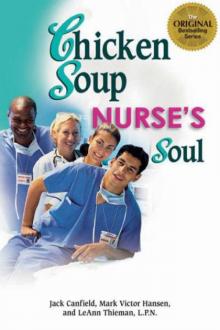 Chicken Soup for the Nurse's Soul: Second Dose
Chicken Soup for the Nurse's Soul: Second Dose Chicken Soup for the Ocean Lover's Soul
Chicken Soup for the Ocean Lover's Soul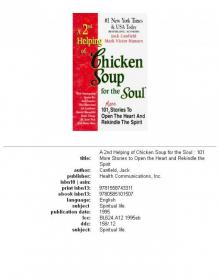 A 2nd Helping of Chicken Soup for the Soul
A 2nd Helping of Chicken Soup for the Soul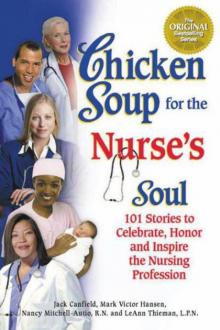 Chicken Soup for the Nurse's Soul
Chicken Soup for the Nurse's Soul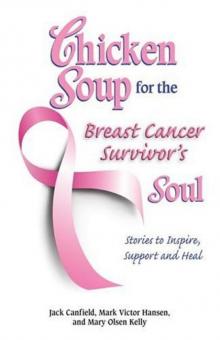 Chicken Soup for the Breast Cancer Survivor's Soul
Chicken Soup for the Breast Cancer Survivor's Soul Chicken Soup for the Pet Lover's Soul
Chicken Soup for the Pet Lover's Soul Chicken Soup for the Bride's Soul
Chicken Soup for the Bride's Soul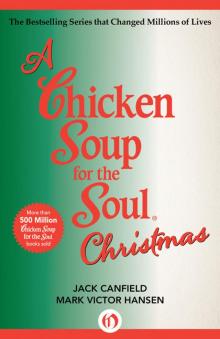 A Chicken Soup for the Soul Christmas
A Chicken Soup for the Soul Christmas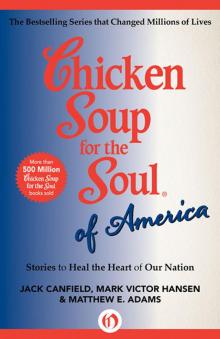 Chicken Soup for the Soul of America
Chicken Soup for the Soul of America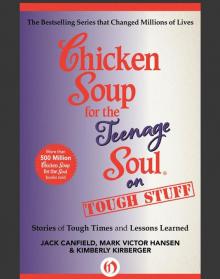 Chicken Soup for the Teenage Soul on Tough Stuff
Chicken Soup for the Teenage Soul on Tough Stuff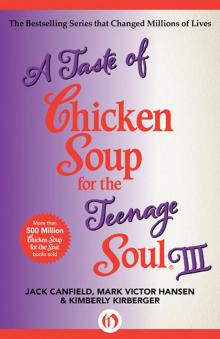 A Taste of Chicken Soup for the Teenage Soul III
A Taste of Chicken Soup for the Teenage Soul III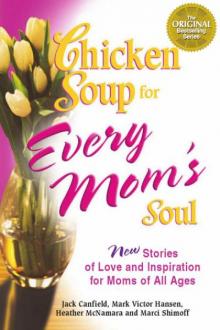 Chicken Soup for Every Mom's Soul
Chicken Soup for Every Mom's Soul Chicken Soup for the Dog Lover's Soul
Chicken Soup for the Dog Lover's Soul A Second Chicken Soup for the Woman's Soul
A Second Chicken Soup for the Woman's Soul Chicken Soup for the Soul the Book of Christmas Virtues
Chicken Soup for the Soul the Book of Christmas Virtues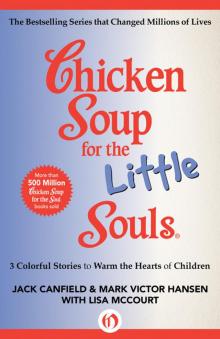 Chicken Soup for the Little Souls: 3 Colorful Stories to Warm the Hearts of Children
Chicken Soup for the Little Souls: 3 Colorful Stories to Warm the Hearts of Children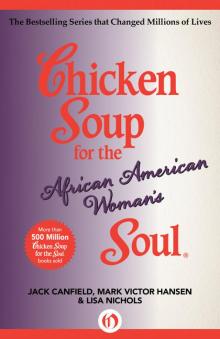 Chicken Soup for the African American Woman's Soul
Chicken Soup for the African American Woman's Soul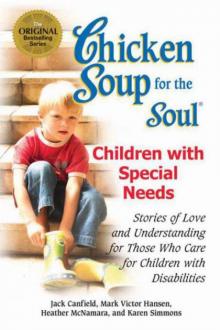 Chicken Soup for the Soul
Chicken Soup for the Soul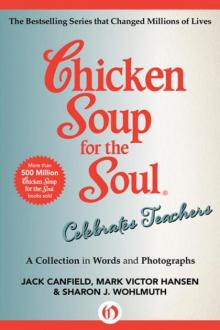 Chicken Soup for the Soul Celebrates Teachers
Chicken Soup for the Soul Celebrates Teachers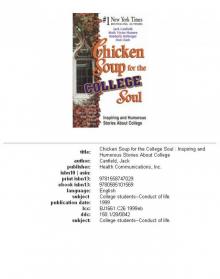 Chicken Soup for the College Soul
Chicken Soup for the College Soul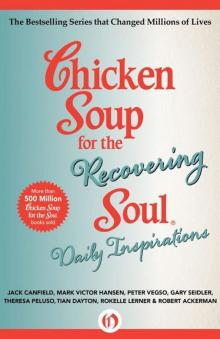 Chicken Soup for the Recovering Soul Daily Inspirations
Chicken Soup for the Recovering Soul Daily Inspirations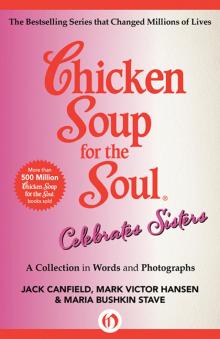 Chicken Soup for the Soul Celebrates Sisters
Chicken Soup for the Soul Celebrates Sisters Chicken Soup for the Dieter's Soul
Chicken Soup for the Dieter's Soul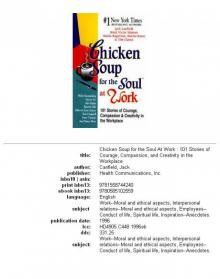 Chicken Soup for the Soul at Work 101 Stories of Courage
Chicken Soup for the Soul at Work 101 Stories of Courage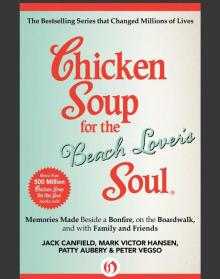 Chicken Soup for the Beach Lover's Soul
Chicken Soup for the Beach Lover's Soul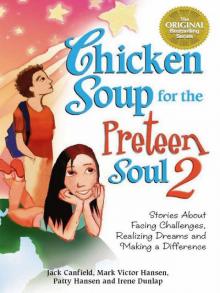 Stories About Facing Challenges, Realizing Dreams and Making a Difference
Stories About Facing Challenges, Realizing Dreams and Making a Difference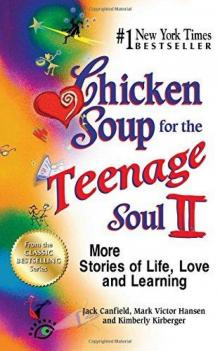 Chicken Soup for the Teenage Soul II
Chicken Soup for the Teenage Soul II Chicken Soup for the Girl's Soul
Chicken Soup for the Girl's Soul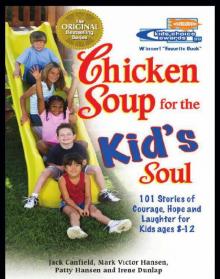 Chicken Soup for the Kid's Soul: 101 Stories of Courage, Hope and Laughter
Chicken Soup for the Kid's Soul: 101 Stories of Courage, Hope and Laughter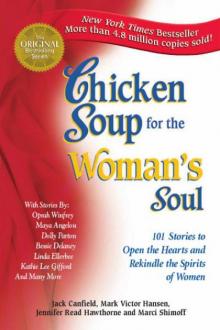 Chicken Soup for the Woman's Soul
Chicken Soup for the Woman's Soul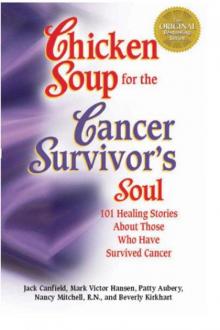 Chicken Soup for the Cancer Survivor's Soul
Chicken Soup for the Cancer Survivor's Soul Chicken Soup for the Canadian Soul
Chicken Soup for the Canadian Soul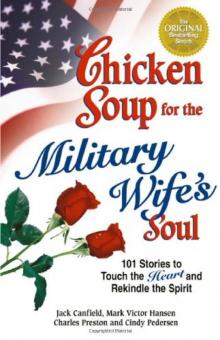 Chicken Soup for the Military Wife's Soul
Chicken Soup for the Military Wife's Soul A 4th Course of Chicken Soup for the Soul
A 4th Course of Chicken Soup for the Soul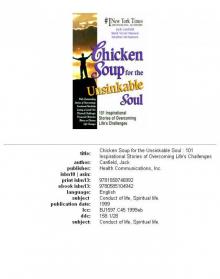 Chicken Soup Unsinkable Soul
Chicken Soup Unsinkable Soul Chicken Soup for the Soul: Christmas Magic
Chicken Soup for the Soul: Christmas Magic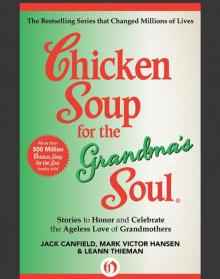 Chicken Soup for the Grandma's Soul
Chicken Soup for the Grandma's Soul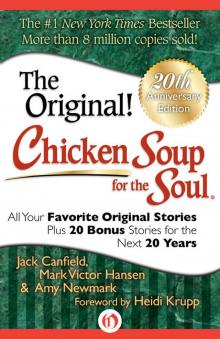 Chicken Soup for the Soul: All Your Favorite Original Stories
Chicken Soup for the Soul: All Your Favorite Original Stories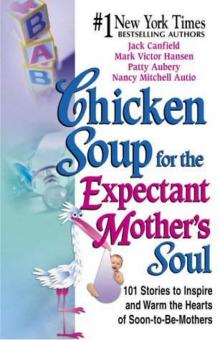 Chicken Soup for the Expectant Mother's Soul
Chicken Soup for the Expectant Mother's Soul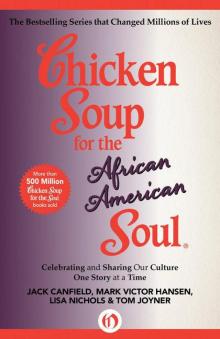 Chicken Soup for the African American Soul
Chicken Soup for the African American Soul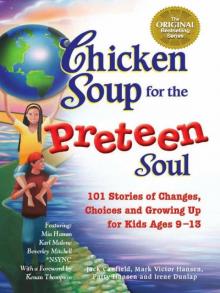 101 Stories of Changes, Choices and Growing Up for Kids Ages 9-13
101 Stories of Changes, Choices and Growing Up for Kids Ages 9-13 Christmas Magic
Christmas Magic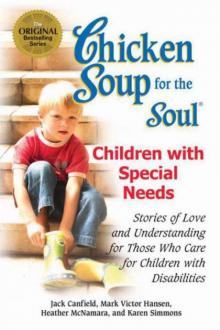 Chicken Soup for the Soul: Children with Special Needs
Chicken Soup for the Soul: Children with Special Needs Chicken Soup for the Soul: Country Music: The Inspirational Stories behind 101 of Your Favorite Country Songs
Chicken Soup for the Soul: Country Music: The Inspirational Stories behind 101 of Your Favorite Country Songs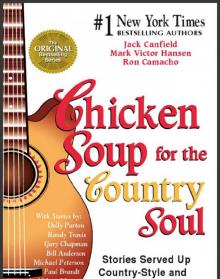 Chicken Soup for the Country Soul
Chicken Soup for the Country Soul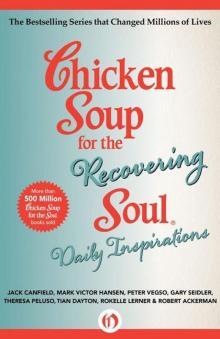 Chicken Soup for the Recovering Soul Daily Inspirations (Chicken Soup for the Soul)
Chicken Soup for the Recovering Soul Daily Inspirations (Chicken Soup for the Soul)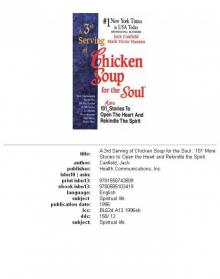 A 3rd Serving of Chicken Soup for the Soul
A 3rd Serving of Chicken Soup for the Soul The Book of Christmas Virtues
The Book of Christmas Virtues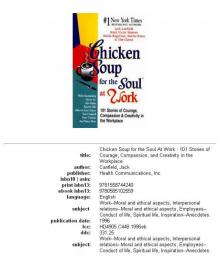 Chicken Soup for the Soul at Work
Chicken Soup for the Soul at Work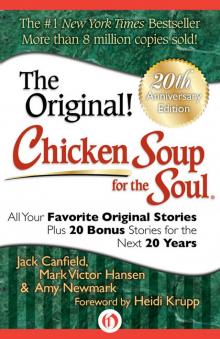 Chicken Soup for the Soul 20th Anniversary Edition
Chicken Soup for the Soul 20th Anniversary Edition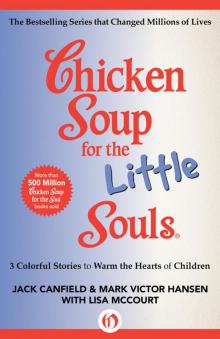 Chicken Soup for the Little Souls
Chicken Soup for the Little Souls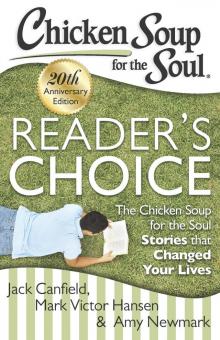 Chicken Soup for the Soul: Reader's Choice 20th Anniversary Edition
Chicken Soup for the Soul: Reader's Choice 20th Anniversary Edition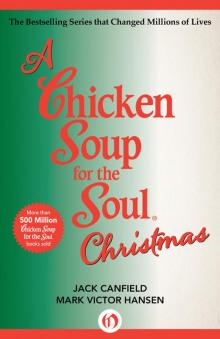 Chicken Soup for the Soul Christmas
Chicken Soup for the Soul Christmas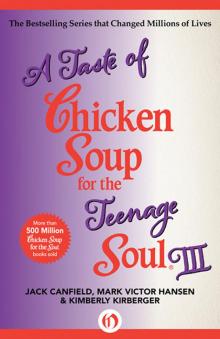 Taste of Chicken Soup for the Teenage Soul III
Taste of Chicken Soup for the Teenage Soul III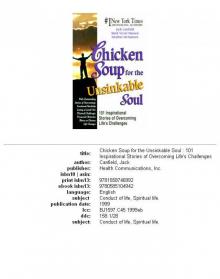 Chicken Soup for the Unsinkable Soul
Chicken Soup for the Unsinkable Soul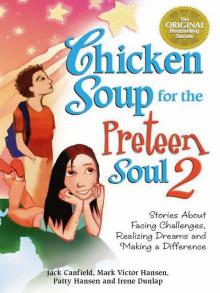 Chicken Soup for the Preteen Soul II
Chicken Soup for the Preteen Soul II